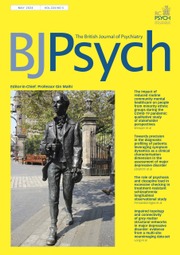- ISSN: 0007-1250 (Print), 1472-1465 (Online)
- Frequency: 12 issues per year
The British Journal of Psychiatry (BJPsych) is a leading international peer-reviewed journal, covering all branches of psychiatry with a particular emphasis on the clinical aspects of each topic. Published monthly on behalf of the Royal College of Psychiatrists, the journal is committed to improving the prevention, investigation, diagnosis, treatment, and care of mental illness, as well as the promotion of mental health globally. In addition to authoritative original research articles from around the world, the journal publishes editorials, review articles, commentaries on contentious articles, a comprehensive book review section and a lively, well-informed correspondence column. BJPsych is essential reading for psychiatrists, clinical psychologists, and all professionals with an interest in mental health.
Digital archives
Digital archives are available for this journal, providing instant online access to a repository of high-quality digitised historical content. For more information, please see the Cambridge journals digital archive.
The British Journal of Psychiatry was originally founded in 1853 as the Asylum Journal and was known as the Journal of Mental Science from 1858 to 1963. The complete archive of contents between 1855 and 2000 has been digitised.
Content preservation
Cambridge University Press publications are deposited in the following digital archives to guarantee long-term digital preservation:
- CLOCKSS (journals)
- Portico (journals and books)
Focus
The British Journal of Psychiatry (BJPsych) is a leading international peer-reviewed journal, covering all branches of psychiatry with a particular emphasis on the clinical aspects of each topic.
Mission
The journal is committed to improving the prevention, investigation, diagnosis, treatment, and care of mental illness, as well as the promotion of mental health globally.
Audience
The journal is essential reading for psychiatrists, clinical psychologists, and all professionals with an interest in mental health. The print version of BJPsych is sent to all members of the Royal College of Psychiatrists, which includes most psychiatrists working in the UK. There is also a substantial international subscriber base.
Ownership & Management
The journal is owned and managed by the Royal College of Psychiatrists and published monthly by Cambridge University Press on behalf of the College. The College grants editorial freedom and independence to the Editor-in-Chief of BJPsych.
Revenue Sources
Both the Royal College of Psychiatrists and Cambridge University Press are not-for-profit organisations, committed to fulfilling their respective objectives of securing the best outcomes for people with mental illness, learning difficulties and developmental disorders and advancing learning, knowledge and research worldwide .
BJPsych receives revenue to ensure we can maintain the highest publishing quality and standards. Revenue sources include: individual and institutional subscriptions; advertising; sales of reprints, rights and royalties; and open access fees. For details on how we avoid charging subscribers for content that has been made Open Access through the payment of an Article Processing Charge ('double dipping'), please see our transparent pricing policy. Please find information about our advertising procedures and guidelines here .
Press and Embargoes
Upon acceptance, BJPsych articles may be selected for press release by the author's institution, the RCPsych media team ([email protected]), or CUP media team ([email protected]). The press release will be distributed under strict embargo, usually with advance access to the full article. Those registered to receive our press releases understand that the embargo is a strict one, and that no information about the article can be published or broadcast until the embargo has lifted. Journalists can contact the authors for comment or further details before the embargo date.
Disclaimer
BJPsych is not responsible for statements made by contributors. Unless so stated, material in this journal does not necessarily reflect the views of the Editor-in-Chief or the Royal College of Psychiatrists. The publishers are not responsible for any error of omission or fact.

